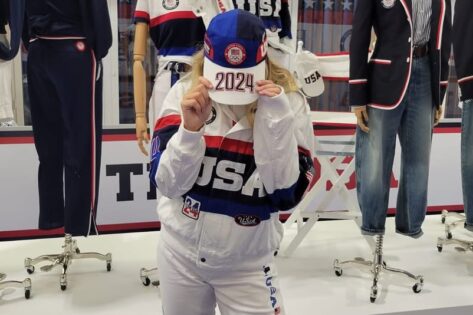In 2001, fresh off her experience as a basketball and soccer player through middle and high school, she entered St. Lawrence University. She knew she wanted to continue competitive athletics and, naturally, thought that would be with one of my existing pursuits. But destiny had its plans. The woman who would go on to become a four-time Olympian was first noticed by the rowing coach at the university. “C’mere. You should try rowing,” the coach said, noticing the athlete who was just under 6 feet tall with an athletic build. She replied. “I don’t know what that is.” Oh, but she did try and went on to become one of the most accomplished rowers the USA has had. But her NCAA and Olympic success had a bridge in between, a bridge that was not easy to cross.
In 2002, Meghan Musnicki had transferred to Ithaca University and by 2003 earned a spot in Ithaca’s varsity 8 boat in her first season with the Bombers and remained a key player for them until her senior year in 2005. During her time at Ithaca, Musnicki, who spent three years on the varsity 8, helped the Bombers win national championships in 2004 and 2005. In 2005, she was named a first-team All-American by the Collegiate Rowing Coaches Association. But as she transitioned from collegiate rowing to elite one, she had a problem. Spoiler: After three years of rowing in college, she had no idea about it.
“I had no idea what elite level rowing was at that point, like zero knowledge of it,” Musnicki said in a 2023 interview as reported by The Democrat and Chronicle in an article on July 24. “I went down to this camp and was immediately cut.” She also confessed that she was probably sent home in the first three days of the camp. She said she was terrible, slow on land, slow on water, and technically worse. This was when she had rowed 7:09 at the CRASH-B’s that year, and US Rowing coach Laurel Korholz suggested that she attend a rowing camp. Had she given up here, the 2 Olympic golds would have never come.
Tokyo 2020 Olympics – Rowing – Women’s Eight – Heats – Sea Forest Waterway, Tokyo, Japan – July 24, 2021. Coxswain Katelin Guregian of the United States, Kristine O’Brien of United States, Meghan Musnicki of the United States, Regina Salmons of the United States, Olivia Coffey of the United States, Brooke Mooney of United States, Gia Doonan of the United States, Charlotte Buck of the United States and Jessica Thoennes of the United States in action REUTERS/Piroschka Van De Wouw
She went to the CRASH-B’s in 2008; she was significantly faster, pulling under seven minutes. Korholz again invited her to a rowing camp, this time in Virginia. She had earned a spot in the women’s four at the camp, but her boat lost at the Olympic trials. The pain of missing another chance of going to the Olympics stung her. But she did not give up, writing a journey of resilience.
Meghan Musnicki’s constant failures to Olympic success
After failing to make the national team in 2008 despite earning a spot in the women’s four, Meghan Musnicki was invited by coach Tom Terhaar to train in Princeton. She deferred nursing school and joined the team. Again, she found herself at the bottom of the team. “I was terrible,” she admitted, “probably close to last.” In May 2009, Terhaar gave her one final chance: hit a tough 6K erg standard by September or be cut for good. She was now fueled by the motivation to prove Terhaar wrong.
Her emotions ranged from sad to mad as she trained, giving her 110%. “You have to stare failure in the face with no excuses,” she said. “So that’s what I did.” In September, Musnicki met the required 6K time and rejoined training in Princeton. By spring, she earned a spot in the women’s eight and helped the crew win World Rowing Cup III and the 2010 World Championships, defeating Canada by nearly four seconds and laying the foundation of her Olympic success.
In her 2012 Olympic debut, Meghan Musnicki helped the U.S. women’s eight win gold in 6:10.59 over Canada and the Netherlands. Four years later in Rio, she earned a second gold as the U.S. dominated again, finishing in 6:01.49 ahead of Great Britain. At Tokyo 2020, she was back in the team, but the U.S. eight finished fourth, just over a second from a medal, in a soul-crushing loss. Coming out of retirement, she returned to Paris 2024, becoming the oldest American woman to row at the Olympics, and finished fifth in what may have been her final Games. Any thoughts about her struggles and career?
The post US Rowing Star Reveals How One Unwanted Decision Led Her To Olympic Gold appeared first on EssentiallySports.
